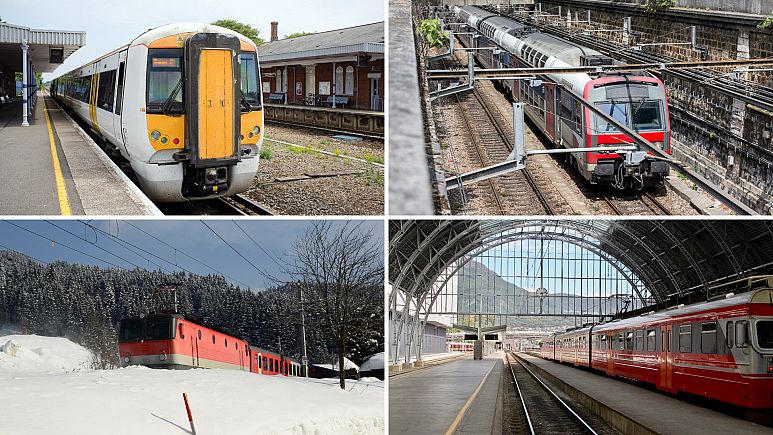Train travel is on the rise across Europe. New sleeper trains and an increasing awareness of the environmental impact of travel are partly to thank. Soaring flight prices stoked by fuel costs and post-pandemic demand also play a part.
But is travelling by train always cheaper than flying?
While commuters can take advantage of discounted season tickets, tourists typically have to fork out for one off train tickets dictated by their travel plans. When budgeting for a trip, travel costs are a key consideration.
Rail fares vary widely across Europe. As of November 2022, train fares had increased by 3 per cent in the EU over the last five years. Inflation hit some European countries harder, such as the UK and Sweden.
So, which countries have the highest rail fares in Europe?
Rail fares depend on the ticket type, such as single or return, and booking time, such as purchasing the ticket on the day of travel or in advance. We’ve considered all these options here, reviewing prices for trips between the train stations of capital cities and the closest train stations within a distance of approximately 80 kilometres.
The routes considered here are based on information provided by Vouchercloud. We also reviewed all datasets for early January 2023 as provided by national railway websites.
Single bookings on the day of travel: UK is most expensive
The UK is the most expensive country by far in terms of single travel with tickets booked on the day of the journey. You would pay £30 (€33.90) to travel from London’s Paddington Station to Oxford.
In 2019, the Trades Union Congress (TUC) released a study showing the increases in rail fares and weekly earnings in the UK. The TUC concluded that rail fares rose by 46 per cent over the past 10 years while nominal weekly earnings increased by only 23 per cent.
Train strikes: These are the countries that pay train drivers the most and the least in Europe
Rail revival: The best new European train journeys to take in 2023
“We’re already paying the highest ticket prices in Europe to travel on overcrowded and understaffed trains,” said TUC General Secretary Frances O’Grady at the time.
Norway is the second most expensive country for one-way rail tickets, with a single from Oslo to Kongsvinger costing €25.20.
Austria, France and the Netherlands are the next most expensive countries, respectively.
Latvia, Hungary, Poland and Slovakia are the cheapest countries for single travel when tickets are purchased on the day of travel. It’s possible to buy tickets for less than €5 in these countries. For example, it costs just €4.10 to travel from Riga to Krustpils.
Germany also offers affordable tickets; it’s possible to travel between Berlin and Fürstenberg for €10.70.
Norway is the most expensive country for return rail tickets
In almost all countries, return or round-trip train tickets are twice the price of a single travel, except in the UK, where there is only a very slight difference between single and return rail fares.
While single travel between London and Oxford is £30 (€33.90), a round-trip ticket would be £32.60 (€37) on the day of travel. This significantly affects comparisons of return fares among countries.
Norway is the most expensive country for train travel as a passenger must pay €50.40 to travel between Oslo to Kongsvinger with a return. Austria follows Norway with €38.60 return fare between Vienna and Melk.
The UK is the third most expensive country in this category, and France and Switzerland closely follow. You would pay €36.80 for return travel between Paris and Chartres, or €34.50 between Bern and Lausanne.
Considering return fares, Latvia, Hungary and Poland are still the cheapest countries with return fares roughly twice the price of single tickets.
Book in advance for cheaper tickets in the UK
Booking in advance often has a considerable impact on rail fares. The earlier you plan, the cheaper the tickets might be. However, this is not necessarily the case for all routes considered here, which are between capital cities and the closest train stations within 80 kilometres.
There are generally slight differences between buying tickets on the day of travel or buying them four weeks in advance. In most countries, it’s not a significant difference.










More Stories
Venice Will Extend Day Trip Tax Through 2025 to Address Overtourism
North America Remains Top Travel Destination, According to Latest Amadeus Report
Biden Administration Launches Investigation Into Airlines’ Competition